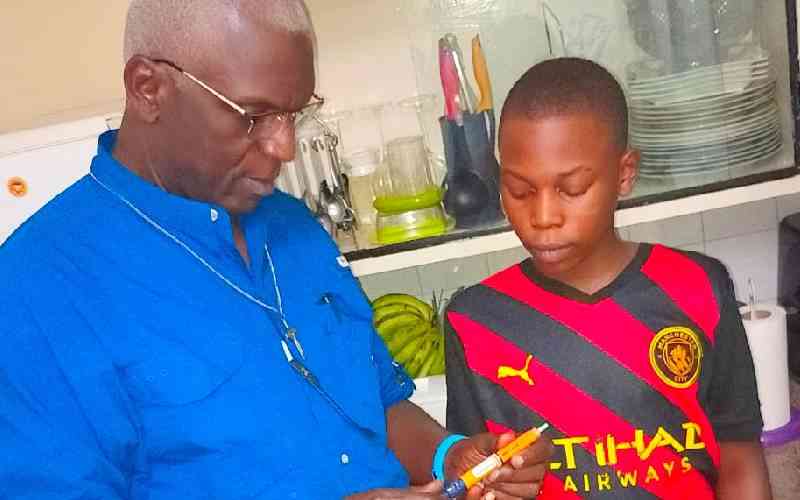
Kenya is grappling with a biting shortage of physicians, with all level four and five hospitals operating without one, respected kidney specialist Dr Sudi Mohamed has said.
Dr Mohamed of Coast General Teaching and Referral Hospital (CGTRH) said that currently in Kenya, one physician handles over 10,000 patients.
He revealed that there are 400 registered physicians under the Kenya Medical Practitioners and Dentists Union (KMPDU) against a population of 52 million Kenyans.
"This means that there are people missing the consultants’ services," he said during the East Central and Southern Africa College of Physicians (ECSACOP) 10th graduation.
Nine Kenyan medical officers graduated as specialised physicians amidst concerns that the biting shortage of consultants would affect the Universal Health Coverage (UHC).
The ECSACOP 10th graduation was in collaboration with the Kenya Association of Physicians (KAP) 28th Annual Scientific Conference.
"One physician treats 10,000 patients, which is against World Health Organisation (WHO) standards. We will ensure that we have enough consultants by 2033," said Mohamed.
The nine physicians were part of 15 graduates from Malawi, Zambia, and Uganda who were part of the intense ECSACOP programme.
- Ministry, governors clash over ghost workers in health payroll
- Health insurance reforms echo NHIF failures, add new burdens
- Government drops 215 UHC 'ghost workers' from payroll
- 'We are watching closely,' Duale warns hospitals over SHA fraud
Keep Reading
Dr Mohamed said the training was aided by six expert doctors from the Royal College of Physicians from Edinburgh, UK, who trained them and also set standard exams.
AMREF Health Africa Group Chief Executive Officer (CEO), Dr Gitahi Githinji, raised concerns over the rising cases of non-communicable diseases (NCD) among children.
Dr Githinji said that NCD screening should ideally start from the age of 10 years, adding that the disease prevalence among kids below 15 years in Nairobi was worrying.
Dr Githinji said that studies done in the Nairobi Eastlands region show the prevalence of pre-hypertension and pre-diabetes in people as young as 15 years is on the rise.
He encouraged all parents to understand that NCD does not start at the age of 30 but from having a poor dietary lifestyle right from childhood.
"While we are seeing these diseases occurring at the age of 60, it is not uncommon to find a person having diabetes and hypertension at the age of 30," said Dr Githinji.
The doctor said there must be regulation and policy for proper food labelling and proper documentation of the caloric load of every product put on the shelf which our parents and kids consume and also harmful industrial trans fats.
Dr Githinji said they seek to continue collaborating with the Kenya Cardiac Society, Kenya Diabetes Study Group and Kenya Renal Association Diabetes Information Study Centre to improve the guidelines to train doctors and nurses in the counties.
KAP Chair, Dr Rose Ngugi, cited lack of diagnosis, consultants, medicine and equipment as contributors to NDC.
Dr Ngugi asked the National Treasury to increase the budget to accommodate NDC screening and management.
She said there is a need to train primary health care physicians and community health promoters to recognise these problems like diabetes.
"Let's talk about prevention, early diagnosis and screening, especially for NDCs like diabetes and hypertension that have been linked to cancer. We find patients with HIV live longer but are developing NDC," said Dr Ngugi.
She said that some companies put sugar in baby formula, while others doctor Brown's loaf by adding food colour.
"At infancy they are putting sugar for those who are not breastfeeding. We also have companies who are doctoring brown loaf by adding food colour," said Ngugi.
She recommended for Kenyans to eat vegetables but know where they are coming from due to pesticides and herbicides linked to cancer.
"When you find yourself drinking a lot of water and passing a lot of urine and losing weight and feeling fatigued, take yourself to an HCP, and they will test your blood sugars," said Ngugi.
She also recommended seven to 10000 steps a day and eating healthy and ensuring all schools have a playground and discourage the use of tablets and iPads during the day.
 The Standard Group Plc is a multi-media organization with investments in media
platforms spanning newspaper print
operations, television, radio broadcasting, digital and online services. The
Standard Group is recognized as a
leading multi-media house in Kenya with a key influence in matters of national
and international interest.
The Standard Group Plc is a multi-media organization with investments in media
platforms spanning newspaper print
operations, television, radio broadcasting, digital and online services. The
Standard Group is recognized as a
leading multi-media house in Kenya with a key influence in matters of national
and international interest.











